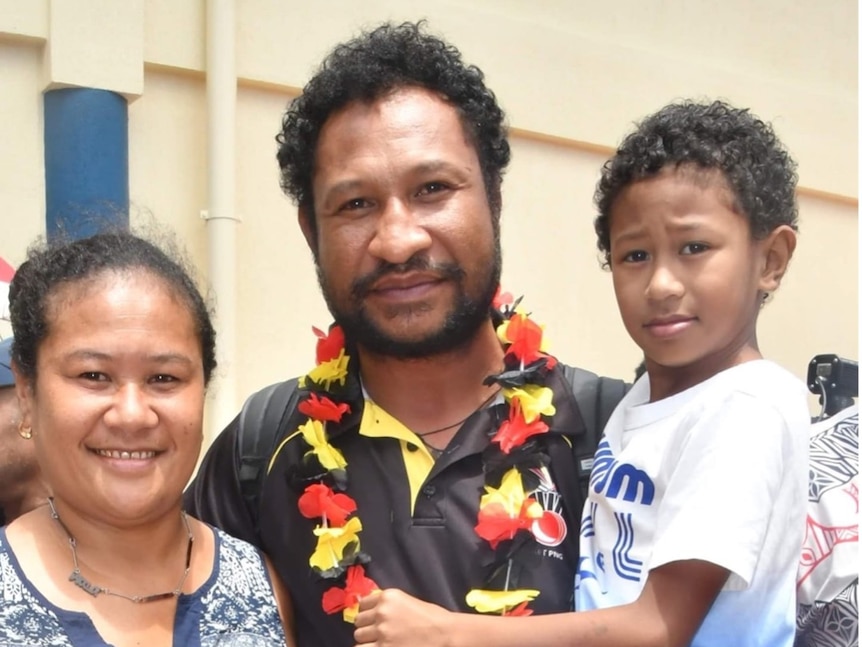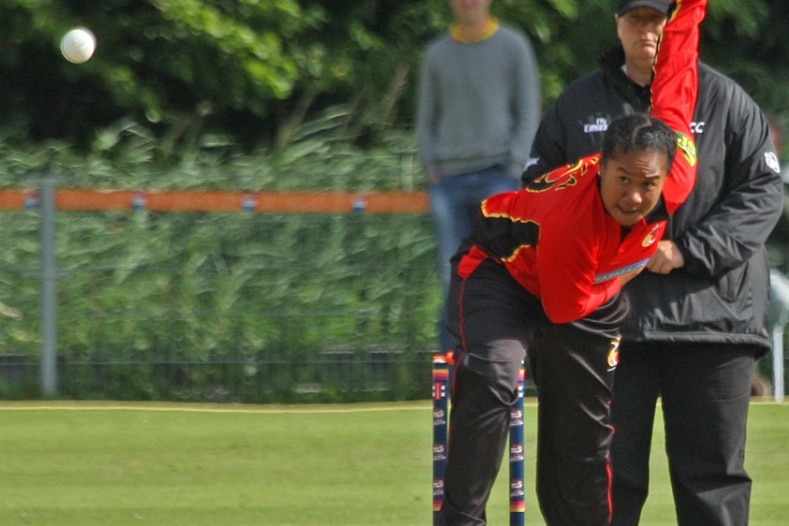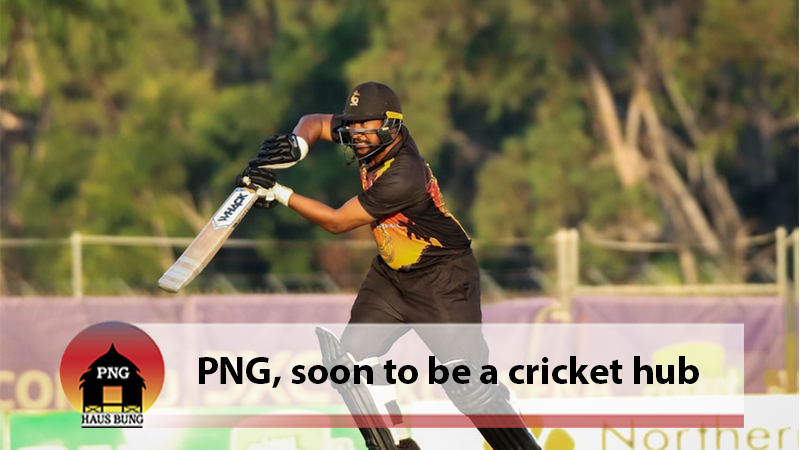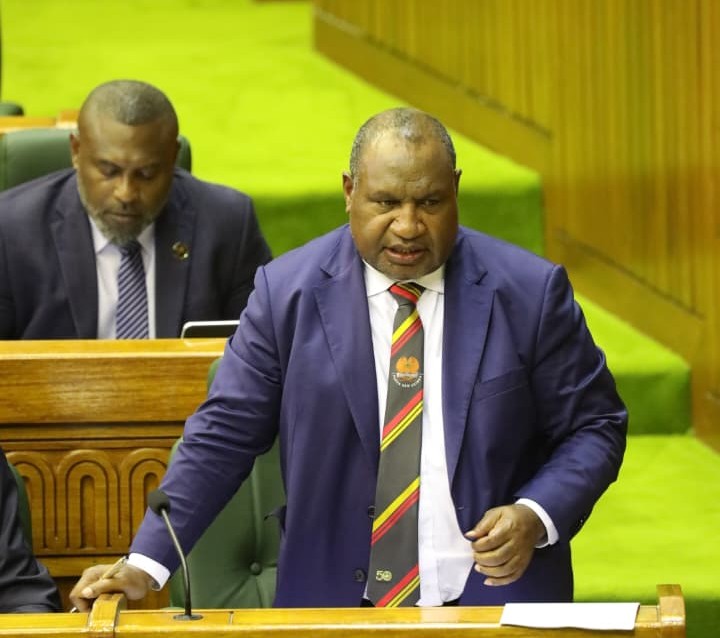Cricket in Papua New Guinea has come far in the last 10 years.
It used to exist on raw talent, passion and little else.
Now, the men's and women's national teams are professional outfits that both sit inside the International Cricket Council's (ICC) top-20 ranked T20 teams.
Cricket PNG is about to receive a funding injection in partnership with Cricket Australia and the Australian government.
Over the next 12 months, the funding will be rolled out to further develop the sport and strengthen ties with Australia as part of the Department of Foreign Affairs and Trade's ramped-up engagement in the Pacific.
Pauke Siaka giggles at the suggestion she and husband Assad Vala are the "King and Queen" of PNG cricket.
"Maybe," said Siaka with a big grin.
Vala is one of PNG's most-capped cricketers. He is a leading run-scorer and is the current skipper for the national men's team, the PNG Barramundis (the Barras).
[caption id="attachment_26605" align="alignnone" width="862"] Pauke Siaka and Assad Vala are key members of the PNG women's (Lewas) and men's (Barras) cricket teams.(Supplied: Pauke Siaka)[/caption]
Pauke Siaka and Assad Vala are key members of the PNG women's (Lewas) and men's (Barras) cricket teams.(Supplied: Pauke Siaka)[/caption]
He was also the first PNG cricketer selected for a global professional team when he played in the Hong Kong Twenty20 Blitz competition.
Siaka was captain of the PNG national women's team, the Lewas, in the 2017/2018 season.
The highly decorated all-rounder is currently on tour with the Lewas in Abu Dhabi for the T20 World Cup qualifiers.
Siaka and Vala share the parenting of their nine-year-old son while juggling their sporting careers.
For the next five weeks, Siaka is playing cricket overseas and Vala will be a stay-at-home dad.
There is a lot of travel in cricket.
Siaka and Vala guess they have been to up to 30 different countries on cricket tours, including Nepal, Namibia, Argentina, Oman, Netherlands, Japan and Thailand.
PNG's Cricket HubSiaka has seen a lot, considering she started playing cricket as a girl on a dirt road "in the village".
But Hanuabada is no ordinary village. It is a hub for cricket like nowhere else in PNG.
Remarkably, 14 of the 17 women in the current Lewas squad are from Hanuabada.
Vala thinks 50 per cent of the Barramundis also hail from the village.
World Vision estimates Hanuabada's population is 20,000.
Not far from Port Moresby, it is known for shack homes built on stilts that reach a hundred metres out into the ocean.
But it is no paradise. Over the years, Hanuabada has struggled to manage waste and rubbish. At times the conditions there have raised international concern.
[caption id="attachment_26609" align="alignnone" width="789"] Like almost all of PNG's Lewas, Pauke Siaka comes from the cricket-mad village of Hanuabada.(Supplied: Cricket PNG)[/caption]
Like almost all of PNG's Lewas, Pauke Siaka comes from the cricket-mad village of Hanuabada.(Supplied: Cricket PNG)[/caption]
It is anyone's guess how Hanuabada became the home of cricket in a nation fanatical about rugby league.
But it has been this way since British missionaries introduced the game in the early 1900s.
Given so many players in the current national teams live in Hanuabada, it will continue to incubate cricket stars well into the future.
When Vala first played cricket for the Barras 10 years ago, there was not much gear and no money.
"Everyone in the national team would share equipment," he said.
"There were only a few bats, pads, and helmets.
"We only used to train a couple of weeks a year.
"There were no player contracts and only one tour a year with no tour allowance."
Thankfully, a lot has changed since then.
'A lot of talent'
A key person who ushered in the new era for Cricket PNG is former Australian Test cricketer and Cricket PNG chief executive, Greg Campbell.
He committed to ensuring players like Vala and Siaka reached their full potential as cricketers while not having to worry about making a living.
When Campbell got a call from an old mate and another former Australian cricketer, Andy Bichel, he did not know where PNG was.
"I didn't even know it existed," Campbell said.
At the time, Bichel was the Barras' head coach.
"He [Bichel] said to me, 'Come help out, this country has a lot of talent but they're very raw,'" Campbell said.
"I went up there for a week. It was an eye-opener … but you just saw the talent.
"There was five-year-old girls and boys throwing balls at stumps and hitting the stumps and knocking them out of the ground … you couldn't get five-year-olds in Australia to do that."
Within a few months, both Bichel and the then-Cricket PNG chief executive left their jobs, so Campbell took on both roles.
For someone who did not know anything about PNG, his leadership has delivered revolutionary growth and development of the sport.
An early breakthrough was in 2013 when he brokered a partnership with the South Australian Premier League to allow the Barras in the six-team competition.
It was the first time a national sporting team of any kind from PNG was accepted to compete in an Australian domestic competition.
Since then, Cricket PNG's school-based cricket development programs have achieved up to 300,000 kids playing cricket.
Players from the national squads run the school and other development programs to work and play in cricket year-round.
Growth of the game
This year, Cricket PNG introduced an under-19 women's team. This brought their national teams to four and gave equal pathways for men and women.
Campbell said the new funding from Australia would be channelled towards coaching and training.
It will place up to six women in Canberra and Perth-based clubs and high-performance centres over the 2022-23 Australian cricket season.
The funding also sponsored the Barras playing in the Northern Territory's Top End T20 competition last month.
The Barras have had a tough year.
They have struggled to regain momentum after experiencing the high of qualifying and playing in last year's men's T20 World Cup for the first time.
Earlier this year, they missed out on qualification for the 2023 T20 World Cup.
They are unable to nudge higher than their 19th ranking on the T20 team rankings.
And they are sitting at the bottom of the ladder for 2019/23 ICC Cricket World Cup League 2 (a tournament based on ODIs) known as League 2.
This is despite beating host nation Nepal to win the ODI bilateral series.
Head coach and former Australia domestic cricketer Carl Sandri resigned last month after a lacklustre 15 months in the job.
With a caretaker coach, the Barras will host USA and Namibia in their first League 2 series in Port Moresby for the following two weeks.
It is the first international match PNG has hosted in four years.
Over in Abu Dhabi, it is up to the ladies to push PNG's chances at the 2023 T20 World Cup.
If they make it to the finals, it will be the Lewas' first World Cup qualification. They are grouped with Thailand, Zimbabwe and UAE.
After years of COVID-19 setbacks to women's International cricket, Siaka said she was "so excited" to represent her country again after a three-year hiatus.
"My family are watching back home and admire me and my husband for representing our country," she said.
"We are living our dream."
Source: ABC News





